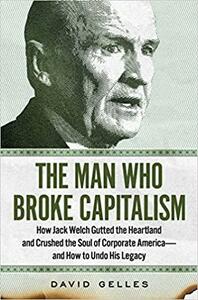Take a photo of a barcode or cover
Really good introduction to a large legacy in American business and economics. Gelles does a good job breaking down how Welch's policies were enacted and connecting them to trends and behaviors we see in business and politics today, but unfortunately I do think his argument misses the forest for the trees. I wish he had included more anecdotes and made the book longer overall but luckily there are many other books talking about this!! and I am reading one right now.
I've seen some quibbling about the way Welch's legacy is portrayed here. And sure, he probably doesn't deserve all the credit for everything his lackeys wound up doing, or for the Trump presidency.
What I think those criticisms of this book are missing, though, is that Welch was a bad person, not that smart, and a con artist and that he does deserve some credit for the absolute disaster that is the modern state of business. I think this book makes it hard to argue with those points.
If you ever meet someone who says they model themselves off of Jack Welch, assume the person is an idiot or a psycho. Run.
What I think those criticisms of this book are missing, though, is that Welch was a bad person, not that smart, and a con artist and that he does deserve some credit for the absolute disaster that is the modern state of business. I think this book makes it hard to argue with those points.
If you ever meet someone who says they model themselves off of Jack Welch, assume the person is an idiot or a psycho. Run.
informative
reflective
I feel like we could be living in a better world had someone told Jack Welch that no amount of power or money would fill the hole in his heart and sent him to therapy.
This was an incisive history of Jack Welch at GE and the downstream effect he and his proteges had on the U.S. economy. Gelles doesn't trash capitalism bat believes we can have ethical capitalism instead of the Welchian take on it. It's a lovely thought, but naive, in my opinion.
We go through cycles where the "leaders of industry" pillage the companies they run, the environments in which they exist, and the very people they rely on to survive. That's the employees and consumers, if you're wondering. And the the governments step in to rein the worst of it in and we're ok for a little while. Then there's another Welch (hmmm, maybe Uber?) to take it up to the pillage level again. Rinse, repeat. Stakeholder Capitalism would be lovely, but someone would come along and kick down our sandcastles again.
Anyway, a good read, even though we diverged at the end.
This was an incisive history of Jack Welch at GE and the downstream effect he and his proteges had on the U.S. economy. Gelles doesn't trash capitalism bat believes we can have ethical capitalism instead of the Welchian take on it. It's a lovely thought, but naive, in my opinion.
We go through cycles where the "leaders of industry" pillage the companies they run, the environments in which they exist, and the very people they rely on to survive. That's the employees and consumers, if you're wondering. And the the governments step in to rein the worst of it in and we're ok for a little while. Then there's another Welch (hmmm, maybe Uber?) to take it up to the pillage level again. Rinse, repeat. Stakeholder Capitalism would be lovely, but someone would come along and kick down our sandcastles again.
Anyway, a good read, even though we diverged at the end.
informative
medium-paced
challenging
informative
I enjoyed the writing style and I think this is a great introduction for undergraduates on how neoloberalism has wrecked havoc on America's middle class. I'd recommend Lights Out by Thomas Gryta and Ted Mann if you want a more in depth and nuanced take on GE. I realize Gelles is using Welch to illustrate how Milton Friedman and van Hayek's ideas, et al, have created material changes but there's a great deal of nuance in these ideas that's been bulldozed over. For instance, van Hayek seemed more awed by the political economy and machinations of capitalism rather than dogmatically stuffing it down people's throats compared to Friedman or Goldwater. I agree that we need to attack the pedestal that our world puts capitalism on. I remember once reading that economists are like modern priests when the Bible was only in Latin - us plebes had to go to the priest did interpretation and were beholden to their views; I think about that analogy a lot to this day. Anyway, there's much to like in this book - it's easy to read, does a good job of explaining how Reagan through Biden have felt the need to kneel before "capitalism" (whereas I'd rather cite Adam Smith's own words back to prefabricated incantations of the "free market), and I agree that Welch was a vulture (who I believe should have been frog marched to jail for his financial manipulation of earnings). Maybe I wrote all this to just show how much I've read and thought about these issues though. Caveat emptor, as they say
informative
medium-paced
If this is your first foray into “wow did a lot of things start to suck after 1980,” you may find this book more enlightening than it is. There’s a better explanation for the downturn around this time, and it’s the conservative policies pushed by the Reagan administration. The book almost realizes this at the end once it starts to prescribe fixes for our current problem, almost all of the proposed fixes are government policies, so maybe government policies had a bit more to do with the problem and Welch (who was a bad guy) was more of a symptom than a root cause.



